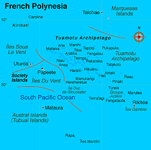The term French Polynesia is applied to the scattered French possessions in the South Pacific—Mangareva (Gambier), Makatea, the Marquesas Islands, Rapa, Rurutu, Rimatara, the Society Islands, the Tuamotu Archipelago, Tubuai, Raivavae, and the island of Clipperton—which were organized into a single colony in 1903. There are 120 islands, of which 25 are uninhabited. The principal and most populous island—Tahiti, in the Society group—was claimed by the French in 1768. The indigenous people are mostly Maoris.
The Pacific Nuclear Test Center on the atoll of Mururoa, 744 mi (1,200 km) from Tahiti, was completed in 1966. In 1975 worldwide opposition forced the French to move the testing underground on Fangataufa. To compensate the residents for the nuclear weapons tests from 1995 to 1996, France offered a 10-year $194-million annual compensation package. An independence movement continues to flourish in French Polynesia. In 2004, France changed its status from a French Overseas Territory to an Overseas Country, which gave French Polynesia more autonomy over local affairs.
Due to a steady stream of shifting alliances and parliamentary motions of no-confidence, more than a dozen governments have come and gone during the period 2004 to 2011. In April 2011, faced with pending legislation from France meant to stabilize the country's political situation, a no-confidence vote was cast against the government of President Gaston Tong Sang. Oscar Temaru immediately became president. This was the fifth time Temaru had been named president. He previously served in 2004, from 2005 to 2006, from 2007 to 2008 and in 2009.
2013 saw a new president and new high commissioner. Gaston Flosse became president in May 2013. This was the fifth time Flosse had been named president of French Polynesia. In September 2013, Lionel Beffre was named high commissioner. He became the tenth high commissioner since 2005. Beffre, a public finance specialist, vowed to help the territory with its economic crisis.
Vice President Nuihau Laurey became acting president in September 2014 after President Gaston Flosse was removed from office due to a corruption conviction by France's highest court. Flosse was fined and given a four-year suspended jail term. At age 83, Flosse was also banned from holding public office for three years. Flosse sought a presidential pardon and a reprieve, but both were denied.


